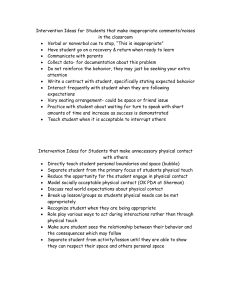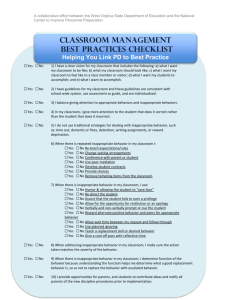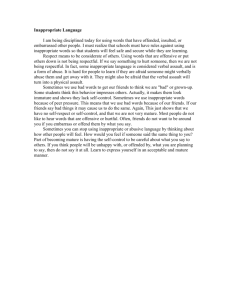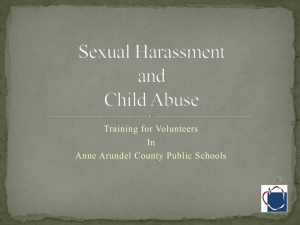Do Your Technical Standards Work For You or Against You?
advertisement
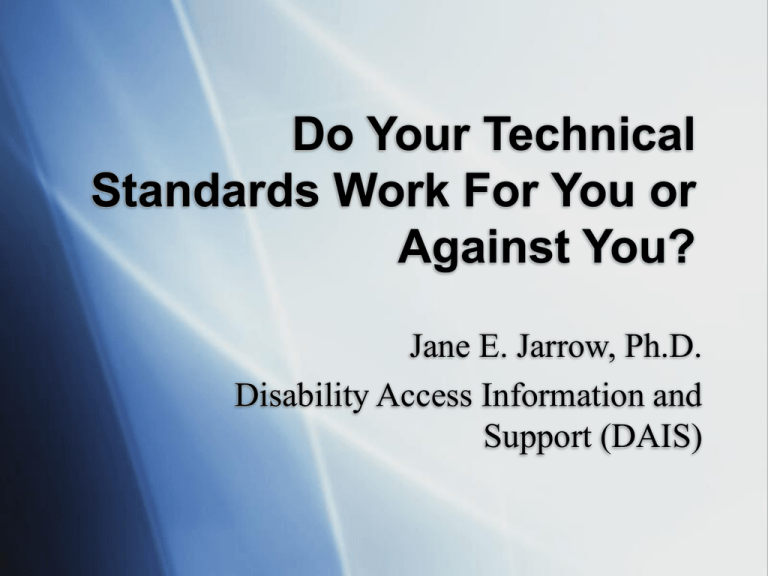
Do Your Technical Standards Work For You or Against You? Jane E. Jarrow, Ph.D. Disability Access Information and Support (DAIS) Use of Technical Standards Assure consistency of evaluation of future professionals Provide quality-assurance that students completing the program have mastered critical skills Help new and prospective students to understand the scope and intensity of training Other? Operating Principles Making accommodations should never entail expecting less; we do not lower standards Focus is on skills necessary to complete training, not on skills presumed necessary in the future Focus on what must be done, not how it is done. What must be done to achieve the goal of the activity? The conduct of the activity is not at issue. Operating Principles (cont) Technical standards should delineate observable performance elements that can be reliably assessed for all students; standards should encompass important elements of performance for all students, regardless of disability status Exit criteria should never be used as entry criteria (for screening out potential candidates) Technical standards should not focus on someone’s status as a person with a disability; the focus is on what students are meant to do, with or without disability Operating Principles (cont) It is inappropriate to set arbitrary limits on the amount of reasonable accommodation allowed; if the accommodation significantly interferes with demonstration of quality or becomes a safety issue, it is no longer “reasonable” Historical precedent (concerning potential work settings) and traditional views of a “typical” professional in the field are not pertinent in the development of technical standards Generally, technical standards relate to skills and techniques taught within the program, not prerequisite knowledge, skills, or abilities that incoming students are thought to possess Which of the following is an inappropriate technical standard for Nursing? a) Ability to maneuver in small spaces such as patient rooms b) Ability to bend, stoop, kneel, or grasp while administering medication and delivering patient care c) Ability to independently transfer a patient weighing up to 175 lbs. d) All of the above are inappropriate e) None of the above are inappropriate Which of the following is an inappropriate eligibility criteria for entrance to a graduate program in Social Work? a) 3.50 GPA in undergraduate coursework b) Ability to function well in stressful situations c) At least 3 hours of college credit in a course focused on cross-cultural communication d) All of the above are inappropriate e) None of the above are inappropriate Which of the following majors does not lend itself to the development of technical standards? a) Elementary education b) Culinary arts c) Math d) All of the above should have technical standards in place e) None of the above need technical standards in place Which of the following is an inappropriate technical standard for Automotive Repair? a) Hear subtle cues from running engine and make appropriate adjustments for maximum engine efficiency b) Test drive vehicle after repair and make appropriate additional adjustments/repairs c) Inspect engine for worn or corroded parts and replace as appropriate d) All of the above are inappropriate. e) None of the above are inappropriate Which of the following is an inappropriate technical standard for an Emergency Medical Technician (EMT)? a) Sufficient mobility to climb stairs and crawl through narrow passages b) Sufficient dexterity to apply tourniquet c) Sufficient hearing to understand and comply with radio instructions d) All of the above are inappropriate e) None of the above are inappropriate Want a Copy? Write to JaneJarrow@aol.com
